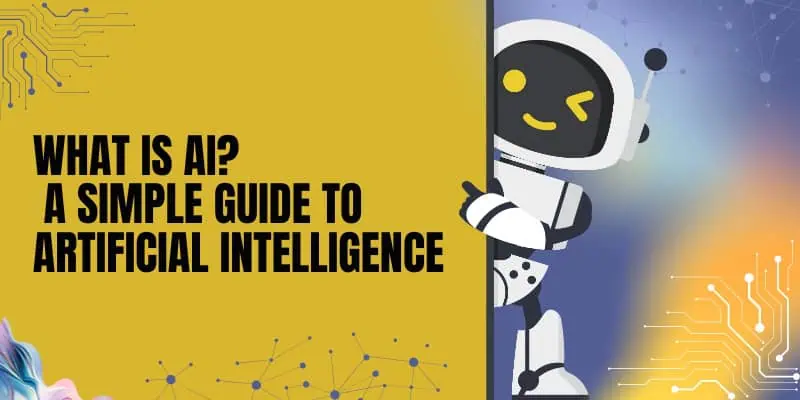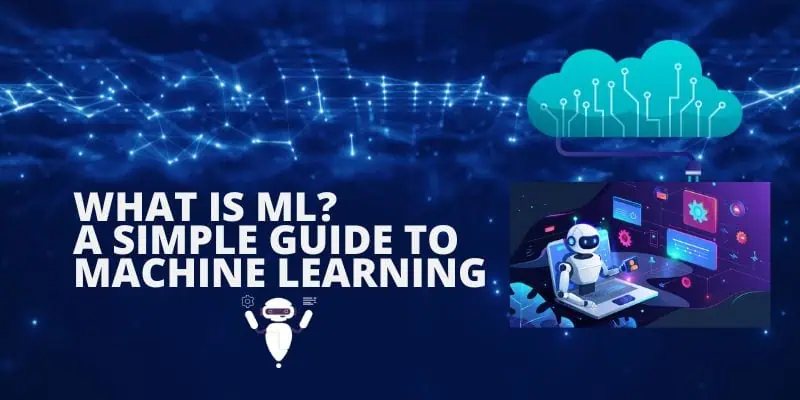What is Artificial Intelligence? Explained in Simple Terms

AI is a computer system that performs tasks which typically require human intelligence. Learn the basics of Artificial intelligence (AI) in our simple guide.
Artificial Intelligence, or AI, is a technology that makes machines and computers think and learn like a humans. It's about developing software that can solve problems, understand language, recognize patterns, and even make decisions.
Imagine a world in which your smartphone can understand voice commands and knows what you need even before you say it.
Now picture cars navigating through cities full of humans, but no human driver, This is not science fiction rather, it is the reality of artificial intelligence (AI), It is possible because of AI.
From voice assistants like Siri and Alexa to recommendation systems on Netflix, AI is already part of everyday life. And AI doesn’t stop there, AI is rapidly advancing, helping industries like healthcare, finance, and even transportation to work smarter and faster.
In this blog, we'll explain what AI is, how it works, and what its benefits, types, and various applications are.
Definition of Artificial Intelligence
"Artificial Intelligence is the science and engineering of making intelligent machines, especially intelligent computer programs." - John McCarthy
John McCarthy is referred to as the father of AI and McCarthy defined that AI is about creating smart computers and programs. It's the work scientists and engineers do to make machines think and act intelligently like humans do.
This mainly involves developing software that can learn, solve problems, and make decisions on its own.
The goal is to build machines that can handle tasks that typically require human-level intelligence.
How Does AI Work
Artificial Intelligence looks smart but actually requires a lot of help to give you the answer.
- 1. Data Collection: First, engineers gather a huge amount of data from internet-text images, Wikipedia articles, social media comments, and more. All this information is saved in one massive file.
- For example: if you show a machine thousands of pictures of cats, it starts to recognize the features of a cat, like fur, whiskers, and pointy ears. After learning, the AI can look at a new picture and decide if it's a cat or not.
- 2. Numbering Data: Since computers only understand numbers, all the text and information are turned into numbers.
- For example: the word "motherhood" might become the number 49836. So, in the end, we just have a giant list of numbers.
- 3. Using a Neural Network: These numbers are then put into something called a "neural network." This is sort of like the human brain. Different parts, or "cells" are attached to each other. For that engineers copied the brain-like structures and put them inside a computer.
- 4. Training the AI: But this "computer brain" isn't smart right away. It needs to be trained over and over billions of times! Every time the AI gets an answer wrong, engineers adjust and improve it. After many trials and fixes, the AI becomes very smart.
- 5. Responses to Questions: Now, whenever you ask the chatbot AI some question, for example, "How large is Abu Dhabi?", it would then be able to give you the correct answer since it has been trained that many times. For instance, it might respond to you with the statement, “Abu Dhabi roughly stands at around 67,000 square kilometres in size.”
Benefits of AI
1. Automation
AI can handle repetitive tasks, like answering customer questions or organizing data, much faster and more accurately than humans.
For example, chatbots are basically automated machines powered by AI and can respond to customer service questions 24/7.
This automation not only saves time but also reduces human errors, making processes more efficient.
2. Reduced Human Error
AI can reduce human errors because it performs various tasks with so much care and accuracy.
imagine that you have to count lots of candies in a large jar. There is a possibility of getting tired or diverted and committing mistakes.
However, an AI will count them precisely each time without getting bored or tired.
For example, doctors sometimes have to scan numerous X-rays to identify issues in a hospital. They may make mistakes if they are too tired.
On the other hand, the AI assistant can check the X-rays and might catch things the doctor missed. In that manner, the AI and the doctor can work together to heal patients better.
So, AI is like a super-focused helper that doesn't get tired or distracted, which helps avoid mistakes that humans might make.
3. 24/7 Availability
AI can work without breaks and getting tired. With AI available 24/7, you can get help or information anytime as per request, day and night.
This allows having an answer to all your questions speedily and efficiently, which solves the problems of finding what you are looking for in a more effortless way without waiting for business hours to pass by. It increases convenience and support in order to remain productive whenever you wish to be.
For example, if you need to know how much is in your account at 3 in the morning, an AI-based chatbot is there to answer for you on the spot. As a matter of fact, it does not matter whether it is nighttime, a weekend, or even a holiday, AI is there to assist.
This means that you can have help or have your queries answered at whatever time you may require them to be answered, rather than wait for someone to wake up or come back from work.
4. Accelerate Research and Development
AI helps to speed up research and development by analysing vast pieces of information much faster than a human being can do.
It easily identifies the most consistent patterns from data, offers predictions, and provides solutions that would be quite a headache for human beings like us to figure out.
For example, An electronics manufacturer uses AI to improve quality control. That's how quality is ensured to be higher, and waste is kept as low as possible.
5. Eliminate Repetitive Tasks
AI can take over boring and repetitive tasks that humans usually have to do over and over again, freeing up their time for more important work and focusing on more core activities.
For instance, In a business, AI automatically sorts emails, processes orders, or updates records without any human support. This saves time and also eliminates mistakes that people may make by doing the same thing repeatedly.
Types of AI
Reactive Machine AI
These are the most basic types of AI. They can only respond to the situation right in front of them. They don't have any memory, nor the ability to learn experiences from the past. They are based purely on reactions toward the present.
For example: A chess-playing AI that analyzes the board and makes the best move possible without remembering past games.
Low Memory AI
This kind of AI can think over some past data or events and come back with an improved decision based on them. It can recall some things for just a little while, not forever.
For example: Self-driving cars use limited memory AI. They see the road conditions, like the positions of other cars and decide how to drive, but they do not hold that knowledge about those conditions for long periods.
Theory of Mind AI
This is a sophisticated form of AI, yet still under development, designed to understand the emotions, beliefs, and thoughts of others. It could interact with humans in a more meaningful way by understanding what we are feeling or thinking.
For example: In the future, a personal assistant AI might be able to understand when you are distressed on what day and at what hour to change how it treats or assists you depending on the mood.
Self-Aware AI
This is the most advanced and theoretical type of AI, where it would be self-aware, thus fully understanding itself like a human does thinking and feeling. It will understand its existence and have consciousness.
For example: An AI robot will be able to say lines like "I am a robot, and I know I'm here," but those things do not exist yet.
Conclusion
AI, or Artificial Intelligence, is a powerful technology that is changing the way we live and work. From making personalized recommendations to solving complex problems, AI is becoming a part of our daily lives. It allows machines to learn, think, and make decisions, making processes faster and more efficient.
While AI has many benefits, like automating repetitive tasks and improving decision-making, it’s important to understand that it is still evolving.
As AI continues to grow, it will bring even more advancements and opportunities across different industries, making our lives easier in ways we might not even imagine what AI could do in the future.
Wait I haven't finished yet, I have a question for you, Are you Looking for expert AI solutions? If yes then Rhosigma could be the right choice for you. It is a leading artificial intelligence and machine learning (AI & ML) solutions provider with a skilled team which has the potential to bring your ideas into practice.
Are you willing to bring your project to life? then contact us today!




